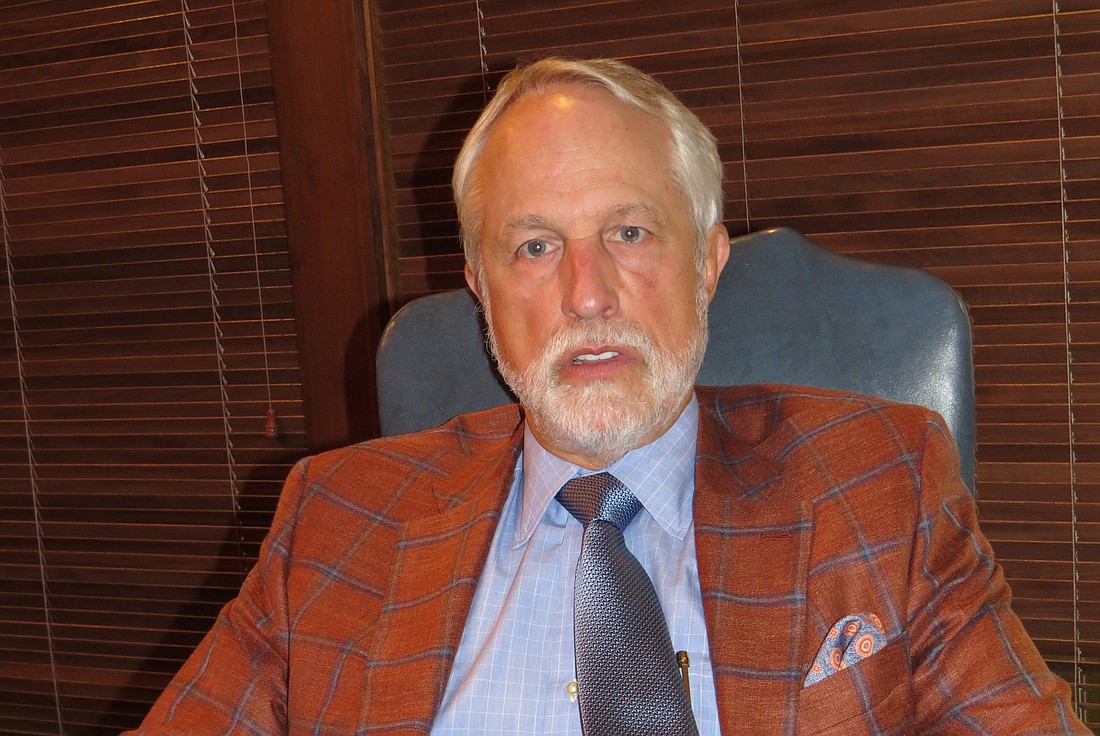
Jury trials are on the decline in the United States as more legal cases increasingly are adjudicated by arbitration or negotiation.
That was among the issues discussed by Dulin Kelly, president of the American Board of Trial Advocates, who addressed the organization’s Jacksonville chapter Wednesday at The River Club.
The Jacksonville stop was the latest in his national tour of state and local chapters at their invitation.
Of the 97 chapters across the country, Kelly anticipates making more than 30 visits before his one-year term ends in December. Florida has a state chapter, one of only three in the country. The others are in California and Texas. There also is a Southeastern chapter.
Kelly specializes in medical malpratice at The Kelly Firm in Nashville, Tennessee.
The primary mission of the trial advocates board is the preservation of the Seventh Amendment to the U.S. Constitution, which guarantees the right of trial by jury. It also focuses on a commitment to diversity of its membership, education and defense of judges from public attack.
Not just anyone can join the Dallas, Texas-based organization. Membership is by invitation only, and experience of at least 10 jury trials is required. The Jacksonville chapter has 90 members.
“You can’t just write a check and join ABOTA,” Kelly told the Daily Record before the luncheon. “You have to have the jury trials and you must be vetted not only by colleagues but by judges as well. You don’t just join ABOTA.”
For the sake of expediency, according to Kelly, courts are adjudicating increasingly more cases without a trial, which he said is in direct conflict with the Seventh Amendment.
“Arbitration is an issue,” Kelly said. “I think some judges now make an effort to settle cases without a trial. Certainly the expense of trying a case is also a factor. Tort reform has an effect on it as well. There are other factors that contribute to it, but trials are dramatically down.”
Fewer trials also have an effect on the organization’s membership. Kelly said it isn’t uncommon for an experienced attorney to not qualify for an invitation.
“There may be a very qualified lawyer who has been practicing for 20 years, but doesn’t have enough jury trials, so that’s becoming a problem,” Kelly said. He said when ABOTA was formed in 1958, the minimum was 20 jury trials. About 10 years ago it was relaxed to 10 trials. “There are many fewer jury trials today than there were even 10 years ago,” he said.
Reticence of prospective jurors also is a contributing factor to the decline in jury trials.
“There are a number of studies that indicate that people want to avoid jury service, yet the majority who have served on a jury said it was a positive experience and they would do it again,” said Joshua Whitman, a partner with the law firm of Milton, Leach, Whitman, D’Andrea & Eslinger, who extended the invitation to Kelly to speak.
“When we’re striking a jury, a common question is, ‘Who would rather be somewhere else today?’” said Whitman. “Usually just about every hand goes up.”
“Getting them there is a challenge,” confirmed Kelly.
Kelly said his address to chapters across the country includes issues beyond the preservation of jury trials. It focuses on education.
“Our purpose is to preserve jury trials, but we do a lot of things,” he said. “We educate children. We educate professionals. We educate teachers. We educate journalists. We do a lot of legal education and we also sponsor a civil Bar roundtable in Washington, D.C., where all the major legal organizations come together and discuss issues that may pertain to them.”
Among those issues is the defense of judges who may come under public scrutiny as a result of their decisions. Kelly said that obligation falls upon legal organizations such as ABOTA.
“Attacks on the judiciary have happened this year and we try to figure out a way to address those,” Kelly said. “ABOTA has a track record of defending judges who are attacked because they can’t defend themselves. We don’t take issue with whether the decision is right or wrong, but to publicly chastise a single judge and call him names is something we are very concerned about.”
For more information about the American Board of Trial Advocates, visit abota.org